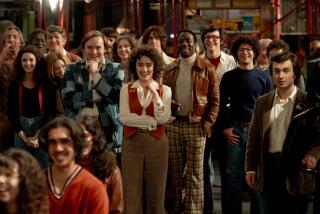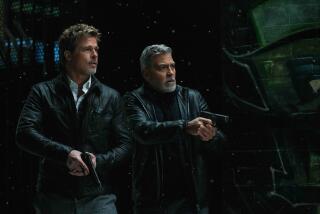A rare ‘Air’ for Jason Reitman and George Clooney
What were your first conversations about how to play Bingham?
Jason Reitman: Our first conversation wasn’t about what the script meant -- there was an understanding of what we were making the movie about. Our first conversation was really, “When do you want to start? When do you want to stop? How many takes do you like doing?” It was just kind of a quick understanding of how do you actually like to make movies -- the process.
Not about the film’s tone?
George Clooney: When you start out as an actor, you read a script thinking of it at its best. But that’s not usually the case in general, and usually what you have to do is you have to read a script and think of it at its worst. You read it going, “OK, how bad could this be?” first and foremost. You cannot make a good film out of a bad script. You can make a bad film out of a good script, but you can’t make a good film out of a bad script. But I read this script and said, “Well, honestly, it’s so well-written, it’s hard to screw it up.”
Is it a liability that in some ways Ryan Bingham represents your public personality as an actor?
Clooney: A lot of the things that are assigned to me in terms of my personal life are dealt with in the film. We had that conversation in Italy. I set the script down and I said, “I know what this would mean, in terms of what people will take away.” Specifically, not just liking the movie, but they’re going to go, “Oh, he’s playing himself.” Which actually isn’t true. But if the film was bad, it would have been a big problem. That’s where all the focus would have been.
I don’t run away from things I’ve done and said over the years. You can’t kind of adjust the story line to make it feel better for you personally. You have to say, “OK, let’s go at it head on.” It’s tricky, and it’s not a particularly easy thing to do.
How so?
Clooney: The best example I can give you is “Batman & Robin.” I don’t think I’ve ever been ripped apart as heavily as I was ripped apart [for that]. I was also still on a television series. So it was, ‘You’re never going to make it in film because of this,’ and ‘He’s buried the franchise.’ And then I was, ‘I’ve got to find a good script.’
And the next project I did was “Out of Sight,” and it was one of the best reviewed films I’ve ever been in. I didn’t suddenly become a good actor. So it really isn’t necessarily about the performer. It’s about the screenplay, the director, all of the other elements that come into play. We get too much credit when things go well, and then we get laid into when things go poorly.
Do you like to work the same way?
Clooney: As a director, I do very few takes, because I feel like you hire the right actor and they’ll do the job right. And the directors that I’ve worked with and had the best luck with -- Jason and [ Steven] Soderbergh and the Coen brothers -- all have been that kind of director. So I asked Jason, do you like a happy set? I’ve done directors’ round tables -- and they forget that I’m an actor -- and someone says, “I don’t like my actors feeling comfortable.” And I sit there going, “I’m never going to work with you.”
Reitman: It’s actually astonishing how many directors want chaos, and enjoy a fight too -- that’s part of their process.
One of the joys of working with George is that he’s a writer and a director, so he completely understands what I’m trying to accomplish on a daily basis. And we both like to make movies in the same way.
If the film were to go off the rails, what would have gone wrong?
Reitman: The easiest thing to do with these characters in this scenario is to judge the characters in the situations they’re in. You have a guy who fires people for a living, in a very tough economy, has made a very political decision to live on his own and meets a woman who believes the exact same thing. The easiest thing to do at that point is turn your character into some kind of ass that the only type of people who fire people are jerks. And the only type of people who want to live on their own are jerks. . . .
What makes it a tricky film to do is that you don’t want to feel the moral judgment of the filmmaker, and you don’t want to feel the moral judgment of the actors playing them.
Clooney: I thought he was a jerk. This is really a tricky film because you’re talking about very important and timely issues. And we’re making fun of it. That’s a tight, tight, tight rope to walk.
What happened to the scenes with Ryan Bingham in an astronaut suit?
Reitman: I remembered having this brilliant idea that the character, who makes many references to spaceflight throughout the film, would see himself as an astronaut -- and have a dream where you see him accomplishing the ultimate spaceflight but ultimately being distanced from everyone around him.
Clooney: With stuff like me hanging from wires.
Reitman: I am happy that it will be on the DVD. However, in a movie that is hyper-real from start to finish, to introduce the idea of a dream sequence, particularly one so surreal, it just didn’t work.
What did the test audiences say about the ending? How do you protect a movie from what is the trained response -- which is everybody has got to be happy?
Reitman: Well, I have final cut, so I never worried about the audience having a confused reaction to the ending and getting into a difficult conversation with the studio about the end of the movie.
And one of the first things I ever said to George is, “Look, I think you are going to like the ending. It’s got a ‘70s ending.” For my movies, and I hope this continues to be the case, I like half the audience to think one thing and half the audience to think another.
Do you worry about the ability to tell these kinds of stories in the future? Serious movies with ambivalent endings?
Clooney: The secret to all of this is, and I’ve been doing this for a long time now, is keeping films within a really moderate budget, which usually means doing them for no money but investing in them -- you get a back-end on it. If it makes money, you make money. But the truth of the matter is -- and he’s done three films that don’t fit into any mainstream box -- he would have had a lot more trouble from the studios if “Juno” cost $75 million.
Reitman: There are directors who think it’s their God-given right to spend as much of the studio’s money as humanly possible. That to me is like fishing out the entire ocean. You wake up the next morning and say, “Where’s all the fish?” There is a way to make interesting films and be responsible.
More to Read
Only good movies
Get the Indie Focus newsletter, Mark Olsen's weekly guide to the world of cinema.
You may occasionally receive promotional content from the Los Angeles Times.











